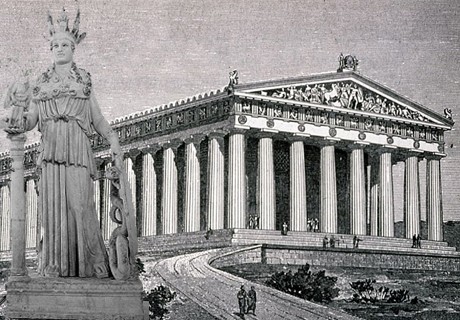

447 to 432 BC – Construction of the Parthenon, dedicated to the virgin goddess Athena.
5th to 15th centuries – the Parthenon is reverenced as a Christian church and later as a mosque.
1687 – Venetian General Morosini lays siege to Athens. A canon shell hits the Parthenon, being used as a gunpowder store, damaging both its roof and side, This is the first extensive damage in 21 centuries.
1799 – Lord Elgin is appointed British Ambassador to Constantinople. In receipt of a letter (firman) from the Sultan he obtains permission to draw the Parthenon sculptures and produce replicas in plaster. This ordinance is never found. A translation in Italian indicates permission to remove a few pieces, meaning the ones dispersed on the ground as a result of the 1687 explosion. Lord Elgin’s team, after bribing the Turkish officer in charge of the Acropolis, proceeds with dismantling the building and the crude removal of its prized sculptures.
1816 – Lord Elgin sells the sculptures to the British Government for £35,000 after a parliamentary committee approves the purchase, 82 votes in favour and 80 against. A group of English parliamentarians claim that Elgin has illegally obtained the sculptures.
1930 to 1940 – The Parthenon sculptures in the British Museum are cleaned with wire brush and acid, causing permanent destruction of their ancient surface
1983 – Melina Mercouri, Minister of Culture for Greece, requests the return of the sculptures. Neil Kinnnock leader of the British Labour Party opposition, promises to return the sculptures when his party gains power.
1997 Tony Blair’s Labour Government declares that the sculptures are not to be returned.
1999 – The European Parliament votes to support the return of the Marbles
2000 – 11 British Parliamentarians begin an inquiry into the return of cultural treasures to their places of origin.
March 2000 – The Greek Ministry of Culture presents a submission to the British parliament requesting the return of the Parthenon marbles.
March 2000 – The Economist magazine conducts an opinion poll amongst 183 members of the British parliament; 66% support the return of the Parthenon Marbles.
March 2002 – Australian Prime Minister John Howard states that the Parthenon Marbles are an irreplaceable part of Greek heritage and national identity.
Despite a mounting international campaign the British government has refused to sanction the return of the marbles.
In response, the International Organising Committee – Australia – for the Restitution of the Parthenon Marbles has been formed in Australia to work towards securing the repatriation of the famous marbles.